Written by Dr Meng Yu and Dr Guodong Du, co-founders of China Justice Observer. [Note: Click on the tables to enlarge them.]
A list of cases on the recognition and enforcement of foreign judgments between China and twenty (20) States and regions has been published by China Justice Observer, a legal information provider based in Beijing. This is a project sponsored by the Academy for the Rule of Law at China University of Political Science and Law. The contributors are Dr. Meng Yu and Dr. Guodong Du, co-founders of China Justice Observer.
You can download the List at:
https://www.chinajusticeobserver.com/a/list-of-chinas-cases-on-recognition-of-foreign-judgments.
The Case List is made available for the readers to build reasonable expectations on recognition and enforcement of foreign judgments (“REFJ”) in China. It comprises public Chinese court decisions involving REFJ, and many (if not all) foreign counterparts concerning the recognition and enforcement of Chinese judgments. Please note that foreign divorce judgments are excluded in the Case List.
To date, China Justice Observer has collected 57 cases involving China and 20 foreign States and regions. The Case List is continually updated with new reports. Case information, comments, and suggestions are most welcome. Please feel free to contact Dr. Meng Yu via e-mail at meng.yu@chinajusticeobserver.com.
For an overview of the disposition of cases on recognition of foreign judgments, please see table 1 below.
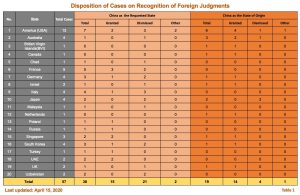
For information about bilateral judicial assistance treaties that China and 39 States have concluded, please see table 2 below.
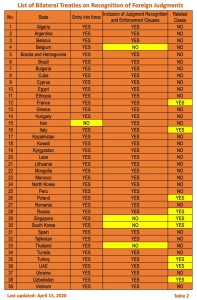
For the detailed country(region) report about cases on recognition of foreign judgments, please see the following charts.
- America (USA) – China
To date, there are 13 court decisions involving the REFJ between China and the United States of America. More specifically:
- In China, there are 7 cases, among which, Chinese courts recognized US judgments in 2 cases, while refused to recognize US judgments in 3 cases.
- In the US, there are 6 cases, among which, the US courts recognized Chinese judgments in 4 cases, while refused to recognize Chinese judgments in 1 case.
Have China and the US concluded any treaty concerning REFJ? No.
What is the prerequisite and basis for Chinese courts to review US judgments? Reciprocity.
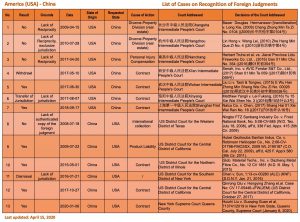
For the case info, please see the list above.
- Australia – China
To date, there are 4 court decisions involving the REFJ between China and Australia. More specifically:
- In China, there is one case, where the Chinese court refused to recognize an Australian judgment.
- In Australia, there are 3 cases, among which, the Australian courts recognized Chinese judgments in 2 cases, while refused to recognize Chinese judgments in 1 case.
Have China and Australia concluded any treaty concerning REFJ? No.
What is the prerequisite and basis for Chinese courts to review Australian judgments? Reciprocity.

For the case info, please see the list above.
- British Virgin Islands (BVI) – China
To date, there is one court decision involving the REFJ between China and the British Virgin Islands (BVI). More specifically:
- In the BVI, there is one case, where the BVI court recognized a Chinese judgment.
Have China and the BVI concluded any treaty concerning REFJ? No.
What is the prerequisite and basis for Chinese courts to review the BVI judgments? Reciprocity.

For the case info, please see the list above.
- Canada – China
To date, there is one court decision involving the REFJ between China and Canada. More specifically:
- In Canada, there is one case, where the Canadian court recognized a Chinese judgment.
Have China and Canada concluded any treaty concerning REFJ? No.
What is the prerequisite and basis for Chinese courts to review Canadian judgments? Reciprocity.

For the case info, please see the list above.
- Chad – China
To date, there is one court decision involving the REFJ between China and Chad. More specifically:
- In China, there is one case, where the Chinese court refused to recognize a Chadian judgment.
Have China and Chad concluded any treaty concerning REFJ? No.
What is the prerequisite and basis for Chinese courts to review Chadian judgments? Reciprocity.

For the case info, please see the list above.
- France – China
To date, there are 5 court decisions involving the REFJ between China and France. More specifically:
- In China, there are 5 cases, among which, Chinese courts recognized French judgments in 3 cases, while refused to recognize French judgments in 2 cases.
Have China and France concluded any treaty concerning REFJ? Yes.
What is the prerequisite and basis for Chinese courts to review French judgments? The bilateral treaty.
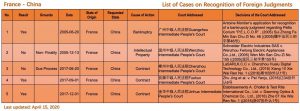
For the case info, please see the list above.
- Germany – China
To date, there are 4 court decisions involving the REFJ between China and Germany. More specifically:
- In China, there are 3 cases, among which, Chinese courts recognized German judgments in one case, while refused to recognize German judgments in 2 cases.
- In Germany, there is one case, where the German court recognized a Chinese judgment.
Have China and Germany concluded any treaty concerning REFJ? No.
What is the prerequisite and basis for Chinese courts to review German judgments? Reciprocity.
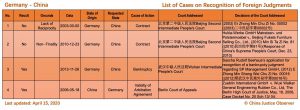
For the case info, please see the list above.
- Israel – China
To date, there are 2 court decisions involving the REFJ between China and Israel. More specifically:
- In China, there is one case, where the Chinese court refused to recognize an Israeli judgment.
- In Israel, there is one case, where the Israeli court recognized a Chinese judgment.
Have China and Israel concluded any treaty concerning REFJ? No.
What is the prerequisite and basis for Chinese courts to review Israeli judgments? Reciprocity.

For the case info, please see the list above.
- Italy – China
To date, there are 4 court decisions involving the REFJ between China and Italy. More specifically:
- In China, there are 4 cases, among which, Chinese courts recognized Italian judgments in one case, while refused to recognize Italian judgments in 3 cases.
Have China and Italy concluded any treaty concerning REFJ? Yes.
What is the prerequisite and basis for Chinese courts to review Italian judgments? The bilateral treaty.

For the case info, please see the list above.
- Japan – China
To date, there are 4 court decisions involving the REFJ between China and Japan. More specifically:
- In China, there are 2 cases, where Chinese courts refused to recognize Japanese judgments.
- In Japan, there are 2 cases, where the Japanese court refused to recognize Chinese judgments.
Have China and Japan concluded any treaty concerning REFJ? No.
What is the prerequisite and basis for Chinese courts to review Japanese judgments? Reciprocity.
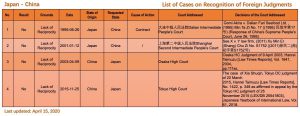
For the case info, please see the list above.
- Malaysia – China
To date, there is one court decision involving the REFJ between China and Malaysia. More specifically:
- In China, there is one case, where the Chinese court refused to recognize a Malaysian judgment.
Have China and Malaysia concluded any treaty concerning REFJ? No.
What is the prerequisite and basis for Chinese courts to review Malaysian judgments? Reciprocity.

For the case info, please see the list above.
- Netherlands – China
To date, there is one court decision involving the REFJ between China and the Netherlands. More specifically:
- In the Netherlands, there is one case, where the Dutch court recognized a Chinese judgment.
Have China and the Netherlands concluded any treaty concerning REFJ? No.
What is the prerequisite and basis for Chinese courts to review Dutch judgments? Reciprocity.

For the case info, please see the list above.
- Poland – China
To date, there is one court decision involving the REFJ between China and Poland. More specifically:
- In China, there is one case, where the Chinese court recognized a Polish judgment.
Have China and Poland concluded any treaty concerning REFJ? Yes.
What is the prerequisite and basis for Chinese courts to review Polish judgments? The bilateral treaty.

For the case info, please see the list above.
- Russia – China
To date, there is one court decision involving the REFJ between China and Russia. More specifically:
- In China, there is one case, where the Chinese court recognized a Russian judgment.
Have China and Russia concluded any treaty concerning REFJ? Yes.
What is the prerequisite and basis for Chinese courts to review Russian judgments? The bilateral treaty.

For the case info, please see the list above.
- Singapore – China
To date, there are 3 court decisions involving the REFJ between China and Singapore. More specifically:
- In China, there are 2 cases, where Chinese courts recognized Singaporean judgments.
- In Singapore, there is one case, where the Singaporean court recognized Chinese judgments.
Have China and Singapore concluded any treaty concerning REFJ? No, but the heads of the supreme courts in China and Singapore signed China-Singapore Memorandum of Guidance on Recognition and Enforcement of Money Judgments (Memorandum of Guidance).
What is the prerequisite and basis for Chinese courts to review Singaporean judgments? Reciprocity.

For the case info, please see the list above.
- South Korea – China
To date, there are 4 court decisions involving the REFJ between China and South Korea. More specifically:
- In China, there are 3 cases, among which, the Chinese courts recognized a South Korean judgment in one case, while refused to recognize South Korean judgments in 2 cases.
- In South Korea, there is one case, where the South Korean court recognized a Chinese judgment.
Have China and South Korea concluded any treaty concerning REFJ? No.
What is the prerequisite and basis for Chinese courts to review South Korean judgments? Reciprocity.

For the case info, please see the list above.
- Turkey – China
To date, there is one court decision involving the REFJ between China and Turkey. More specifically:
- In China, there is one case, where the Chinese court recognized a Turkish judgment.
Have China and Turkey concluded any treaty concerning REFJ? Yes.
What is the prerequisite and basis for Chinese courts to review Turkish judgments? The bilateral treaty.

For the case info, please see the list above.
- UAE – China
To date, there are two court decisions involving the REFJ between China and the UAE. More specifically:
- In China, there are two cases, where the Chinese courts recognized UAE judgments.
Have China and the UAE concluded any treaty concerning REFJ? Yes.
What is the prerequisite and basis for Chinese courts to review UAE judgments? The bilateral treaty.

For the case info, please see the list above.
- UK – China
To date, there are 2 court decisions involving the REFJ between China and the UK. More specifically:
- In China, there is one case, where the Chinese court refused to recognize British judgments.
- In the UK, there is one case, where the British court recognized a Chinese judgment.
Have China and the UK concluded any treaty concerning REFJ? No.
What is the prerequisite and basis for Chinese courts to review British judgments? Reciprocity.

For the case info, please see the list above.
- Uzbekistan – China
To date, there are two court decisions involving the REFJ between China and Uzbekistan. More specifically:
- In China, there are two cases, where the Chinese courts refused to recognize Uzbekistani judgments.
Have China and Uzbekistan concluded any treaty concerning REFJ? Yes.
What is the prerequisite and basis for Chinese courts to review Uzbekistani judgments? The bilateral treaty.

For the case info, please see the list above.

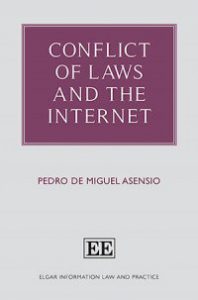
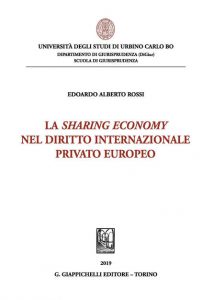 In the current economic and social context new and controversial sharing practices, offering anyone the opportunity to search for or make available goods or services on the market regardless of the professional or amateur nature of the persons involved, have emerged. These practices, very heterogeneous and concerning the most different areas of daily life, such as mobility, housing, business activities, communications, work, culture, communication, education and finance, have been linked to the notion of “sharing economy”, which brings them together by virtue of temporary access to goods or services, facilitated by the large-scale intervention of digital platforms, through which requests and offers are coordinated online in order to share goods or services.
In the current economic and social context new and controversial sharing practices, offering anyone the opportunity to search for or make available goods or services on the market regardless of the professional or amateur nature of the persons involved, have emerged. These practices, very heterogeneous and concerning the most different areas of daily life, such as mobility, housing, business activities, communications, work, culture, communication, education and finance, have been linked to the notion of “sharing economy”, which brings them together by virtue of temporary access to goods or services, facilitated by the large-scale intervention of digital platforms, through which requests and offers are coordinated online in order to share goods or services.




















